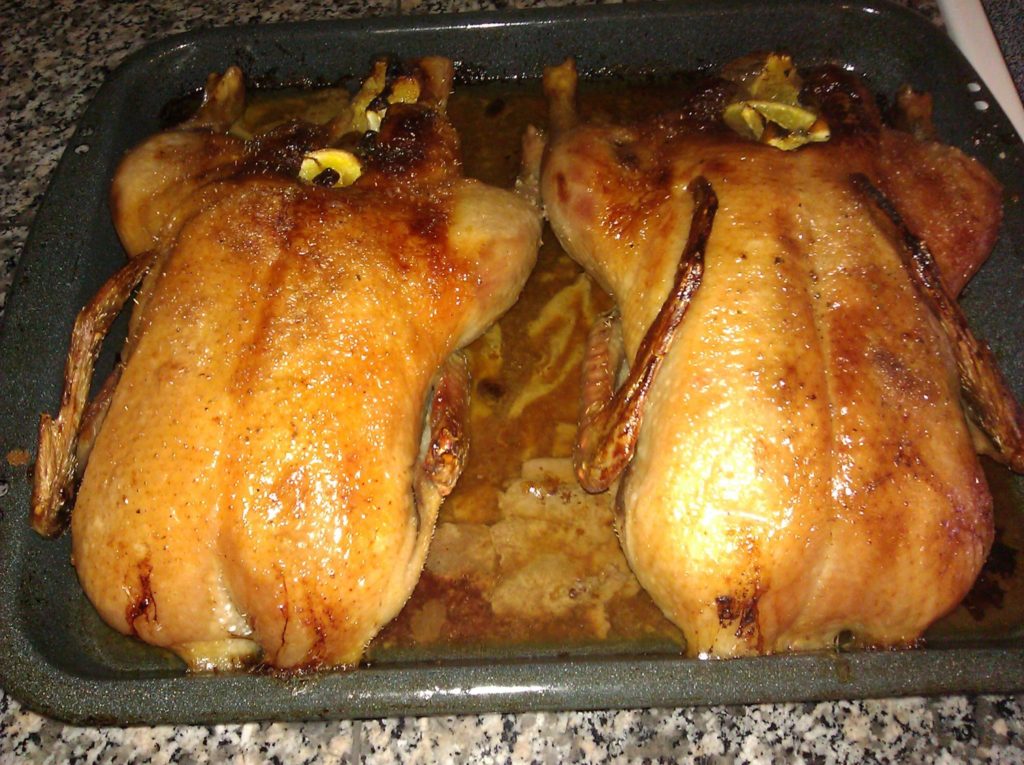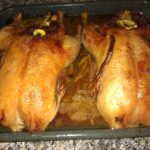Recipe plus video for roast duck and bone broth that is perfect for the main meal and gravy for holidays and special occasions.

We roasted two ducks for Christmas dinner this year, and after we picked them clean, I made a ton of homemade bone broth too.
As luck would have it, I was able to source them for a fantastic price. For such a gourmet dinner choice plus the duck broth, they turned out less expensive than the local chickens I buy!
Duck is a much fattier bird than turkey or chicken. One great benefit of roasting a fatty bird like duck or goose is that you can cook it at a higher temperature, so the meal is ready faster, yet there is little risk of dried out meat.
We baste our duck while it is cooking. This glazes the meat beautifully and results in the most out of this world crispy duck skin you’ve ever tasted.
There is much less meat to be had on a duck versus a turkey, but you get a ton of duck fat in return. I save this wonderfully healthy, nutritious, tasty fat in a glass container in the fridge and use it for weeks later to season roast vegetables.
My children never turn down vegetables roasted in duck fat. They are simply too delicious to resist (even more tasty than veggies cooked in butter if that is possible)!
Duck also happens to make the most delectable bone broth, so be sure to save all those drippings.
Need a stuffing recipe that blends well with the richness of duck meat? Try this healthy roast duck stuffing that is perfect for this type of poultry.

Homemade Duck Broth Recipe
Recipe for homemade duck broth made from roasted duck that serves as a rich and nourishing base for soups, sauces, and gravy.
Ingredients
- 2 roasted ducks meat removed
- filtered water
- apple cider vinegar
- giblets optional
- chopped onion, celery, carrots optional
Instructions
-
Place duck carcasses in a large stockpot. Break up the bones into pieces if necessary to fit the pot.
-
Add cold filtered water – enough to cover.
-
Add a small amount of store bought or homemade apple cider vinegar. 1/4 cup works well. Stir.
-
Leave on the counter for 30 minutes per French culinary practice.
-
Place stockpot on the heat and bring to a boil. Skim off and discard any foam (off flavors and impurities) that rise to the top just before boiling is reached.
-
Add optional cooked giblets with juices and chopped veggies, and then turn the heat down to low, cover, and let simmer for 3 hours for meat stock and up to 8-24 hours for bone broth.
-
Remove from heat, cool and strain into large 1/2 gallon mason jars or containers of choice.
-
Duck broth will stay good for up to 5 days refrigerated. Freeze what you will not use during that time.
Recipe Video
More Information
Benefits of Duck Eggs: More Nutritious and Less Allergenic








Love your site. We have our first 10 ducks going to the butcher on Oct. 10th – Can’t wait to taste them (although they are a little cute…) We’re blessed to be able to have our food in our ‘back yard’ on this little farm. Next year we’re adding chickens and a dairy goat!
I will be looking on here many times as we enjoy them…thanks!!
Hi Sarah,
Just wondering if you add vegetables and/or herbs to your duck stock. If you do, when do you do that? Thank you.
A friend is giving me a duck to butcher today. I have butchered chickens many times, but this will be my first duck. Not easy to do. I LOVE ducks! But this poor thing is crippled and needs to be culled. I watched your video here again this morning and feel encouraged. Thanks, Sarah!
I cannot even begin to thank you for the wealth of information you have been giving me in your video classes. At the start of 2012 I resolved to get my husband and myself healthy. I am more concerned with nutritionally verses most resolving to loose weight as I know the only way to keep weight off is to change my lifestyle. So on that side note thank you for all your amazing information.
I do however have a question I noticed that you didn’t mention anything about canning stock and was wondering why. Is it better for us to freeze our stock over canning it?
Thank you;
Denielle
Could I add red wine to duck stock?
Hiya Sarah,
I can never get my water to stay at a slow simmer after I cover it. I put the flame so low that you can barely see it. If I have to leave it for 24 hours I worry it might evaporate from boiling. And please please please put your stock pot on the back burner for safety 🙂
Ps- Your videos are so much easier to understand than reading them in Nourishing Traditions. And did your husband retire from show biz? I’m sure he has something else up his sleeve besides gravy. I liked that video because I was always intimidated by gravy.
I made a duck tonight and it was so good. It was hard to carve and I didn’t know if that is typical though. I am making duck broth now and following your instructions. The broth has started to boil and I have found no scum on it whatsoever. I don’t know if I just didn’t do it right or I have an amazingly clean bird. Have you ever had that happen? I can’t wait to try the stock. What do you use the duck stock for and do you have recipes posted for it?
Hi Claudine, you just use duck stock like you would use chicken stock in any of your favorite soup recipes. I do have several posted on this blog both as video and written recipe form if you check out the archives.
I just wanted to mention that here in the south of France people generally stuff their bird with more meat! Often it’s porc (the mixture they put in sausages), the bird’s inners and mushrooms occationnaly chesnuts. I was lucky to have a great turkey for Christmas eve and a heavenly goose for Christmas. I made stock from both of these birds afterward and there was no scum at all but I didn’t add any vinegar, could that be why?
I’ve diligently kept the fat but I am looking for more uses for it. In my fridge I’ve got turkey, duck, goose and porc fat waiting to be used. I’m open to all sugestions!
PS: I have no idea why one would let the bones sit in the water before starting the cooking process but I’ll ask around!
I’ve asked around and I got two answers conserning why the french start making broth with cold water:
– to avoid the spintering of the bones due to a thermal shock
– when making broth from raw meat, they soak the bird first to rid it of bood, the water is discarded and fresh water is added to make the broth . It then make a clearer broth but unfortunetly without the nutriments found in the blood.
Sarah,
Thank you for the video. My husband is an avid hunter and I end up with 10+ ducks/geese a year in my freeze. Sadly, until this video I never gave it a thought to save the whole duck (typically he would debone and toss bones) for stock! I just told him when the season starts I would like a few whole ducks!
Thanks again
Danielle, 10+ ducks/geese in a year? I am sooo envious. You will be so excited when you taste you first batch of duck or goose stock. It makes out of this world soups and sauces!
Hey Sarah,
Great post! Duck is amazing. My wife works for another local farm where they use ducks in their rice, the same way we use livestock in our orchards. The ducks eat the bugs, weeds, provide fertilizer, and aerate the water as they paddle around. It’s common practice to raise ducks on rice in Asia but this is the only farmer we know of that does it in the U.S. The meat is amazing! I love duck and it’s by far the best duck I’ve ever had. Alice Waters at Chez Panisse put in an order to try to buy everything he can produce.
http://massaorganics.blogspot.com/2009/09/integrated-riceduck-farming-part-i.html